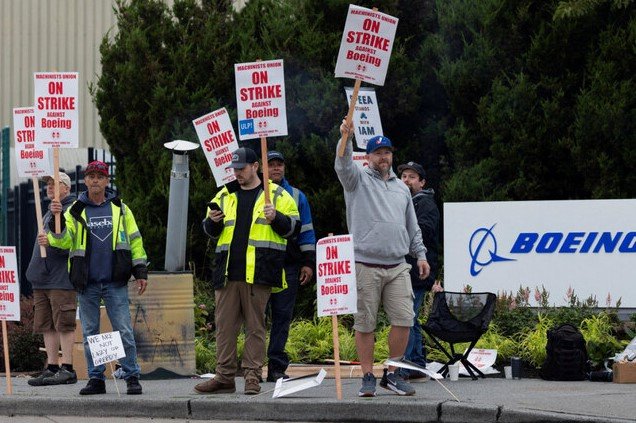Boeing has granted additional time for the union representing 33,000 striking workers to vote on its latest contract proposal. The aerospace giant’s “best and final” offer, which includes a 30% pay raise over four years, has been met with resistance from the union members. The union, which initially demanded a 40% raise over three years, has criticized Boeing for not engaging in further negotiations and for presenting an offer that falls short of their expectations.
Union’s Initial Response to Boeing’s Offer
The union’s initial reaction to Boeing’s latest proposal was far from positive. Union leaders expressed disappointment, stating that the offer did not meet the demands of the workers. They emphasized that the negotiating committee had no input on the offer, which led to a lack of enthusiasm among the members. The union’s decision not to hold an immediate vote reflects the widespread dissatisfaction with Boeing’s terms.
Despite Boeing’s insistence on the urgency of the vote, the union has maintained that it needs more time to organize and communicate with its members. The extension granted by Boeing is seen as a necessary step to ensure that all voices are heard and that the decision-making process is thorough and democratic.

The union’s stance highlights the ongoing tension between the workers and the company. The workers’ demands for better pay and working conditions have been a central issue in the strike, and the latest offer from Boeing has done little to alleviate their concerns.
Boeing’s Strategic Move
Boeing’s decision to extend the voting deadline can be seen as a strategic move to avoid further escalation of the strike. By allowing more time for the union to deliberate, Boeing aims to demonstrate its willingness to accommodate the workers’ needs. However, the company’s refusal to engage in additional negotiations has been a point of contention.
The aerospace giant’s offer includes a 30% pay raise over four years, which is an improvement from the previous offer of 25%. Despite this increase, the union members have expressed that the offer still falls short of their expectations. The union had initially demanded a 40% raise over three years, highlighting the significant gap between the two parties’ positions.
Boeing’s approach to the negotiations has been criticized for its lack of flexibility. The company’s insistence on the “best and final” nature of the offer has left little room for compromise, further straining the relationship with the union. The extension of the voting deadline is a temporary measure, but it does not address the underlying issues that have led to the strike.
Future Implications for Boeing and the Union
The outcome of the vote on Boeing’s latest offer will have significant implications for both the company and the union. If the union members reject the offer, it could lead to a prolonged strike, further disrupting Boeing’s operations and impacting its financial performance. On the other hand, if the offer is accepted, it could pave the way for a resolution to the ongoing conflict.
The strike has already had a considerable impact on Boeing, with production delays and financial losses. The company’s ability to meet its delivery schedules has been compromised, affecting its reputation and customer relationships. The resolution of the strike is crucial for Boeing to regain stability and continue its operations smoothly.
For the union, the vote represents a critical moment in its efforts to secure better pay and working conditions for its members. The outcome will determine the future direction of the negotiations and the union’s ability to advocate effectively for its members. The union’s leadership will need to navigate the complexities of the situation and ensure that the members’ voices are heard and respected.
